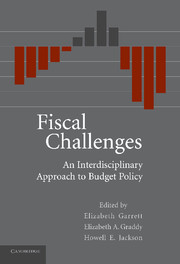Book contents
- Frontmatter
- Contents
- Preface
- Contributors
- PART ONE THE LAW AND POLITICS OF FISCAL POLICY
- PART TWO UNDERSTANDING FEDERAL DEFICITS AND PUBLIC DEBT
- PART THREE BUDGETING AND FISCAL CONSTRAINTS AT THE STATE LEVEL
- 8 Budgetary Arrangements in the 50 States: In Search of Model Practices
- 9 The Calculus of Constraint: A Critical Review of State Fiscal Institutions
- 10 When Does the Ballot Box Limit the Budget? Politics and Spending Limits in California, Colorado, Utah, and Washington
- Part Three Bibliography
- PART FOUR INTERGOVERNMENTAL ASPECTS OF BUDGET POLICY
- PART FIVE JUDICIAL POWERS AND BUDGET POLICY
- Index
8 - Budgetary Arrangements in the 50 States: In Search of Model Practices
Published online by Cambridge University Press: 23 December 2009
- Frontmatter
- Contents
- Preface
- Contributors
- PART ONE THE LAW AND POLITICS OF FISCAL POLICY
- PART TWO UNDERSTANDING FEDERAL DEFICITS AND PUBLIC DEBT
- PART THREE BUDGETING AND FISCAL CONSTRAINTS AT THE STATE LEVEL
- 8 Budgetary Arrangements in the 50 States: In Search of Model Practices
- 9 The Calculus of Constraint: A Critical Review of State Fiscal Institutions
- 10 When Does the Ballot Box Limit the Budget? Politics and Spending Limits in California, Colorado, Utah, and Washington
- Part Three Bibliography
- PART FOUR INTERGOVERNMENTAL ASPECTS OF BUDGET POLICY
- PART FIVE JUDICIAL POWERS AND BUDGET POLICY
- Index
Summary
Recent interest in state fiscal institutions has produced a burgeoning theoretical and empirical literature that addresses the fiscal, economic, and political impacts of these institutional arrangements. Scholars and policymakers look to the states to understand the effect of specific reforms on budgetary outcomes, and to gain general insight into the capacity of institutional reforms to improve performance of state as well as federal budget processes. Indeed, the states offer rich potential for our efforts to understand and predict the consequences of fiscal policy.
The states and their constituent local governments collect a substantial share of public receipts in the United States, approximately 40 percent in 2004. Therefore, their fiscal policies have important impacts on their citizens and on the economic performance of the country. More importantly, considerable variation exists among the states with respect to fiscal policy and not infrequent changes in these policies. It is this variability that offers the potential for a better understanding of the consequences of specific fiscal practices.
Here, we consider the most important budgetary practices used across the 50 states and review the insights that empirical research has provided about their likely impacts on fiscal performance. We begin by describing the incidence of the state budgeting arrangements we review, followed by a discussion of the conceptual and methodological challenges that confront efforts to evaluate budgetary policies at the state level. Next we review the empirical literature and analyze our current state of understanding of the effectiveness of these budgetary arrangements.
- Type
- Chapter
- Information
- Fiscal ChallengesAn Interdisciplinary Approach to Budget Policy, pp. 251 - 270Publisher: Cambridge University PressPrint publication year: 2008
- 1
- Cited by



